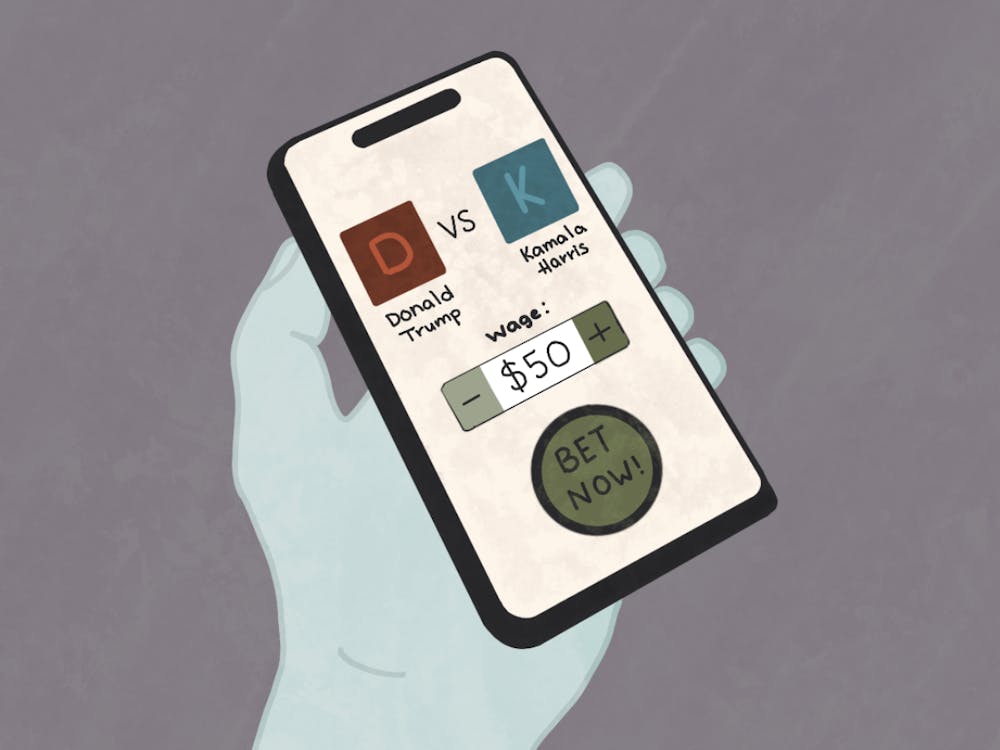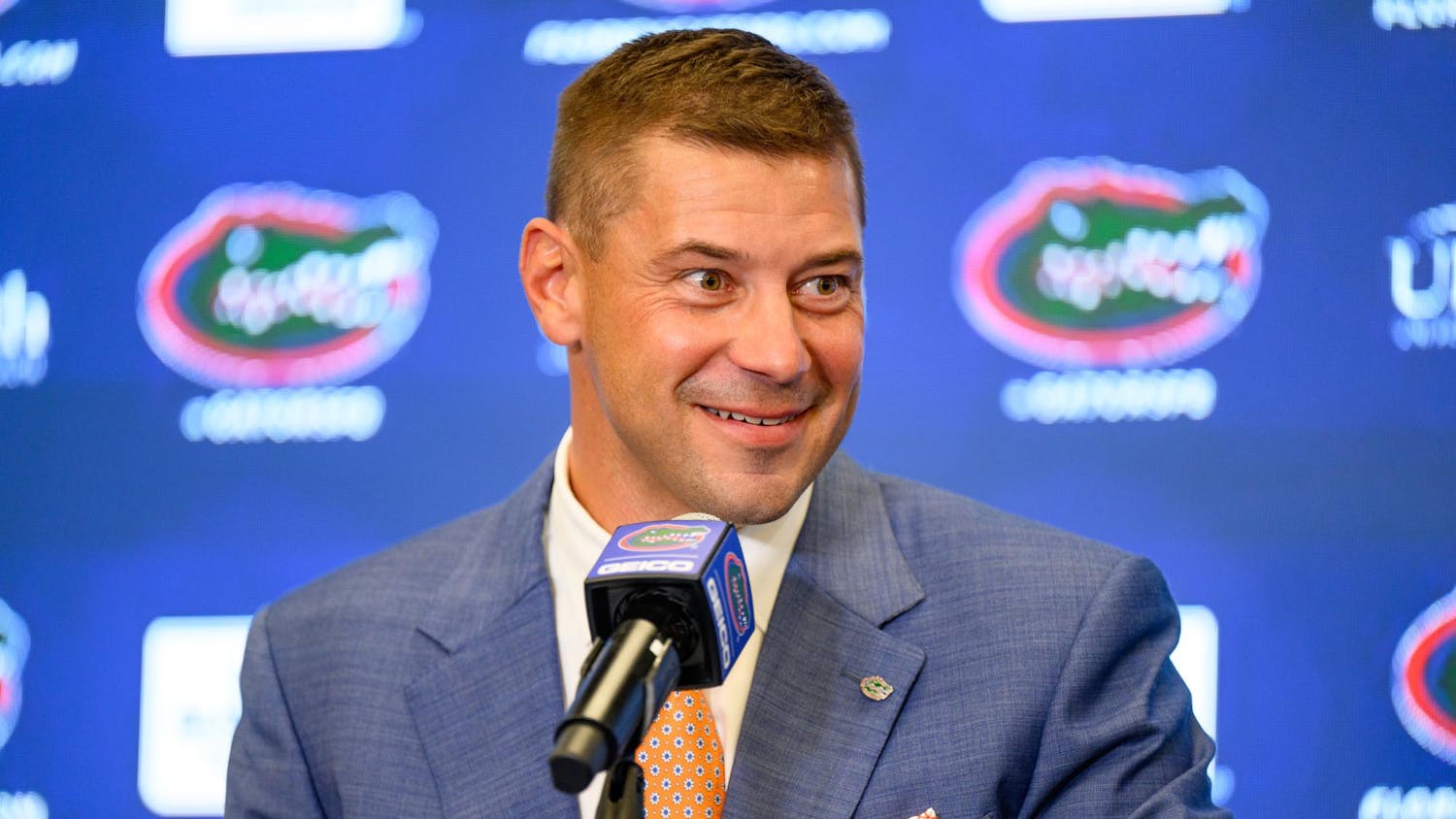Choosing the leader of the free world can be a gamble. Some take this literally, the most deep-pocketed among them wagering seven figures on presidential nominees.
NBC reported last week that a French trader bet $28 million on a Donald Trump victory. If the former president wins, so does the bettor, to the tune of $46 million.
This phenomenon has captured Gen Z's attention. At UF, politically engaged Gators track election prediction markets.
Some experts, including UF political science assistant professor Cassidy Reller, hope gambling will propel young people, who are otherwise low-propensity voters, to the polls.
“People that aren’t engaged with voting because they find it boring might find it more fun if they can bet on that, make money on that,” Reller said.
However, he advised against looking to gambling to predict the race’s outcome. Certain markets have partisan leanings, he said, which skew betting activity.
A small segment of Americans engage with political prediction markets, meaning bettors do not represent the broader electorate. Like sports betting, election gambling is gaining traction among men under 30, with whom Trump has made substantial inroads.
Many election bettors use cryptocurrency-fueled Polymarket, the world’s largest platform for wagering on current events. Users can buy and sell shares until an event occurs. While the site prohibits Americans from entering election markets, bettors can skirt the rules using virtual private networks.
Polymarket has seen a recent surge in pro-Trump wagers, buffeted by billionaire tech mogul and Trump supporter Elon Musk, who tweeted Oct. 6 that prediction markets are “more accurate than polls.”
While most polls show a close race, some Polymarket users are betting heavily on a Trump victory, giving him a 64% lead over Vice President Kamala Harris’ 36%. A handful of wealthy bettors are responsible for the yawning gap.
Some, including Trump himself, have taken this in stride.
UF College Democrats president Connor Effrain said he’s observed the phenomenon first-hand. He explained Gators — primarily young men — approach his organization’s table on campus to discuss the candidates’ Polymarket performance, boasting Trump’s odds.
“Since young men who are more likely to support Trump are also the ones more likely to be betting, they are probably going to bet in his favor,” Effrain said. “So using it as an indicator has glaring issues.”
Beyond sampling concerns, Effrain said prediction markets have become fodder for election memes, snuffing out political thoughtfulness among young voters.
Harris and Trump have leveraged social media to court young voters at the expense of more traditional campaigning.
“There's just so many [Instagram] reels or TikToks that just make jokes out of gambling on the election,” Effrain said. “[Bettors] don't really care who the winner is. They only care about how they can make money off of it.”
UF College Republicans did not respond to requests for comment before publication.
Before Oct. 2, political gambling was legal only on two platforms with strict betting thresholds. In the three weeks since the judiciary lifted a freeze on the financial exchange and prediction market Kalshi, tens of millions of dollars in bets have flooded the site. Rival platform PredictIt caps wagers at $850, while Kalshi caps them at $100 million.
Kristina Wright, 47, said she finds the judicial timing curious but doesn’t think the legalization of political betting will shake up the race. The UF political science graduate student warned that betting odds could affect voting intent, but bets themselves cannot supplant polling.
“It’s not a scientific method, and there's a lot of self-selection bias inherent in the betting process,” she said.
While prediction markets aren’t infallible, they have been reliable bellwethers in past races. Favorability odds on sites like Intrade have accurately tracked presidential outcomes since 1980, barring the 2016 race.
Santa Fe College adjunct political science professor Alex Patton has experience using political prediction markets and said he takes issue with their lax oversight.
“There's absolutely no regulation on this, and these markets are usually offshore,” Patton said. “I think that they're being manipulated, that I don't see a whole lot of safeguards built in.”
Patton said he’s concerned about potential election interference. Betting sites, he said, could meddle with social cues and social proof, in which people use others’ actions to decide their own. He explained that if one candidate pulls ahead of another on a betting site, voters may flip their position or stay home Nov. 5.
Online gambling, he added, has wrought substantial harm on its target demographic. Patton predicts that political betting will have deleterious downstream effects.
“This is really egregious,” he said. “It’s gonna take us years to figure out the hell we've unleashed on young men.”
Scott Teitelbaum, vice chair of UF’s psychiatry department, isn't so sure. He said people who traditionally bet on sports are unlikely to wager on the presidency and even less likely to develop an addiction to political gambling.
David Price, a political science professor at Santa Fe College, echoed Teitelbaum, noting young men aren’t generally interested enough in politics to put money on elections.
Price said he doesn’t think election betting will significantly impact the 2024 election. But in a race where candidates aren’t as polarizing or captivating as Harris and Trump, like the 1996 presidential race, election betting may spice things up, he said.
“A boring campaign like that, maybe, something like this would help mobilize people, but this is not that,” Price said.
Contact Natalie Kaufman at nkaufman@alligator.org. Follow her on X @Nat_Kauf.
Natalie Kaufman is the business enterprise reporter and a second-year journalism major. Outside the newsroom, you'll catch her drinking too much caffeine and running.






